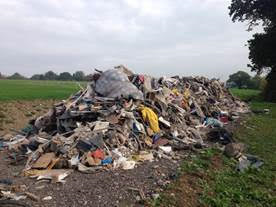The Ulster Farmers’ Union (UFU) says the reopening of local recycling centres is a positive step forward in reducing incidences of fly-tipping and litter in the countryside.
UFU deputy president Victor Chestnutt said, “We’re pleased that local recycling centres have reopened to the public and we hope that incidents of fly-tipping will fall as a result. During the coronavirus pandemic, there was a huge increase in illegal dumping in rural areas as the public struggled to deal with excess household and garden waste due to the restrictions that were in place. The cases of fly-tipping were so great that removers are still busy collecting unwanted waste from undesignated sites.
“We would like to thank the staff of recycling centres across Northern Ireland, for adhering to social distancing rules and Government guidelines, enabling local facilities to open. They have been very supportive in encouraging the public to dispose of their waste responsibly and at the appropriate sites. When rubbish is dumped illegally and is traced back to the source, the person responsible for fly-tipping will have to dispose of it. To help prevent this, it is important that the public check that the individual(s) removing their waste has a waste carrier license; legitimate waste removal companies will also be able to provide an official weight ticket which will identify the disposal site.
“Our farmers are glad to see this message being reiterated as many have fallen victim to fly-tipping since lockdown began. Removing fly-tipping waste is both costly and time consuming for farmers and other landowners. Once unwanted content is dumped on their land it becomes the responsibility of the landowner to dispose of this waste while local councils are left to take ownership of waste on public land and highways.”
With lockdown restrictions continuing to ease and many returning to work, road traffic is increasing. The UFU is encouraging all road users to manage their rubbish while travelling until they can bin it appropriately.
“Northern Ireland’s rural roads and hedgerows have fallen foul to the actions of fly-tipping with the inappropriate disposal of waste increasing greatly in recent months. Fly-tipping is not only a hazard to public health and the environment, polluting watercourses and contaminating land, but it can also be harmful to wildlife and animals. Animals are inquisitive and may ingest materials that have been dumped which can cause sickness and even result in multiple deaths creating severe financial pressure for the farmer. Too often drivers will dispose of rubbish out the window when driving which is unacceptable,” said Chestnutt.


